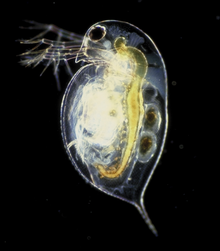Winfried Lampert
Winfried Lampert (born September 20, 1941 in Oppeln ) is a German ecologist who is best known for his work in the field of limnology and zoological ecophysiology .
Life
Winfried Lampert studied biology at the University of Freiburg , where he received his doctorate in 1971 with a thesis on the systematics, biology and population dynamics of the Coregons in Schluchsee and his habilitation in limnology in 1977 . After his habilitation he went to the Johann Wolfgang Goethe University in Frankfurt as a lecturer . In 1980 he became head of a junior research group of the Max Planck Society at the Max Planck Institute for Limnology in Plön , Schleswig-Holstein .
Since 1984 Lampert was director and head of the department for ecophysiology at the Max Planck Institute in Plön. In 1986 he became an adjunct professor at the University of Kiel , in 1996 he became an honorary professor . In September 2008, Lampert retired from the Max Planck Institute, his retirement at the University of Kiel took place in October 2006. After Lampert's retirement, the institute was renamed the Max Planck Institute for Evolutionary Biology in April 2007 and lost its limnological focus almost complete. Lampert is still working at the institute, however, and is accompanying the development of Daphnia into a model organism of aquatic ecology.
research
Winfried Lampert dedicated his research to the ecology of zooplankton and developed models of interspecific interrelationships between species, especially competition and predator-prey relationships . As a model organism, he mainly used water fleas of the genus Daphnia , on which he researched the population structure , the evolution of defense strategies and phenotypic plasticity ( e.g. cyclomorphosis ).
For his work, Lampert was awarded the Naumann-Thienemann Medal of the Societas Internationalis Limnologiae in 1995 and the Ecology Institute Prize in Limnetic Ecology and the Winberg Medal of the Russian Hydrobiological Society in 2006. In 2012 he received the AC Redfield Lifetime Achievement Award from the Association for the Sciences of Limnology and Oceanography . Since 2005 he has also been an external member of the Polish Academy of Sciences .
Fonts
In addition to numerous specialist publications, Winfried Lampert also published several book publications. The following list is a small selection from the list of publications:
- Investigations on the systematics, biology and population dynamics of the Coregons in Schluchsee. Freiburg i. B., 1970.
- Food limitation and the structure of zooplankton communities Schweizerbart , Stuttgart 1985.
- Winfried Lampert, Ulrich Sommer : Limnoecology: the ecology of lakes and streams. Oxford University Press 1997.
- Winfried Lampert, Ulrich Sommer: Limnoecology. Thieme Verlag, Stuttgart 1993 (1st edition), 1999 (2nd edition).
- Evolutionary ecology: natural selection in freshwater systems. In: A. Moya, E. Font (eds.): Evolution: from molecules to ecosystems, Oxford University Press, Oxford 2004; Pp. 109-121.
- Vertical distribution of zooplankton: density dependence and evidence for an ideal free distribution with costs. BMC Biology 3 (10), 2005.
- Daphnia: model herbivore, predator and prey. Pole. J. Ecol. 54, 2006: pp. 607-620.
- Natural selection is ecology in action. Swiss beard, Stuttgart 2006.
- A. Liljendahl-Nurminen, J. Horppila, W. Lampert: Physiological and visual refuges in a metalimnion: an experimental study of effects of clay-turbidity and an oxygen minimum on fish predation. Freshwater Biology 53, 2008: pp. 945-951.
- W. Lampert, U. Sommer: Limnoecology, 2nd Edition, Oxford University Press, Oxford 2007.
Web links
- Literature by and about Winfried Lampert in the catalog of the German National Library
- Curriculum vitae of Winfried Lampert at the Max Planck Institute for Evolutionary Biology (formerly MPI for Limnology)
Individual evidence
- ↑ ASLO: AC Redfield Lifetime Achievement Award ( Memento of August 28, 2009 in the Internet Archive ), accessed June 14, 2013.
- ↑ Selection from the list of publications by Prof. Dr. Winfried Lampert ( memento of September 2, 2009 in the Internet Archive ) at the University of Osnabrück and the catalog entry of the German National Library.
| personal data | |
|---|---|
| SURNAME | Lampert, Winfried |
| BRIEF DESCRIPTION | German ecologist, university professor and former director at the Max Planck Institute for Limnology |
| DATE OF BIRTH | September 20, 1941 |
| PLACE OF BIRTH | Opole |
